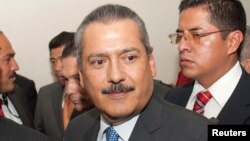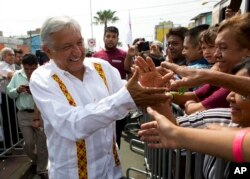Mexico's ruling Institutional Revolutionary Party (PRI), long the country's dominant political force, must recognize its future may lie in sharing power with longtime rivals, one of its most senior lawmakers said.
Manlio Fabio Beltrones, a former PRI party chairman and Senate leader, said the increasingly fragmented political landscape in Mexico can only be repaired if parties take joint responsibility for government.
To that end, Beltrones wants to introduce rules to make coalition governments possible before Mexico elects a new president in 2018 — a move that would mark a shift in the balance of power away from a presidential system that has dominated the nation for decades.
Mixing patronage, corruption and authoritarianism, the PRI ruled Mexico for 71 years straight until 2000. But the system built by the PRI started to unravel when the party lost outright control of Congress in 1997.
No party has held a congressional majority since then, and for the past 20 years presidents have cut ad-hoc deals with the opposition to pass laws during prolonged periods of deadlock.
"The system is worn out," Beltrones, 64, told Reuters in a recent interview.
The PRI recaptured the presidency in 2012 but graft scandals, gang violence and weak growth have sullied its reputation. Polls suggest the Congress elected alongside the next president in July 2018 could be more divided than ever.
2014 change
Anticipating a need for greater consensus, lawmakers in 2014 changed the constitution to create a basis for coalition governments, a provision that previously did not exist.
However, Congress has been unable to agree on the legislation to implement the change.
Beltrones has proposed rules to govern how Congress would oversee future coalitions by ratifying key cabinet posts and a plan for government put forward by the president. He hopes the proposal will become law before next July.
However, while several senior opposition figures are supportive, it remains unclear whether the PRI is ready to back a plan that implicitly recognizes its waning influence.
Divided presidential field
The reform would also test the front-runner for the presidency, former Mexico City mayor Andres Manuel Lopez Obrador, whom some critics believe it aims to hem in.
Twice runner-up for the presidency, the leftist Lopez Obrador split with the PRI in the 1980s. He has ruled out working with other major parties, saying they are corrupt.
Mexico's unpopular president, Enrique Pena Nieto, is constitutionally barred from seeking re-election.
A July 23 poll by newspaper Reforma put Lopez Obrador's party, the three-year-old National Regeneration Movement, in first place on 28 percent. The centrist PRI was back in third on 17 percent in a deeply divided field.
Beltrones said that if the leading parties are struggling to secure a third of the vote, Mexico cannot afford to exempt others from the responsibility of government.
But some inside the PRI believe it could scrape home alone in 2018 if the opposition remains divided.
Asked in a recent interview with Reuters whether it was good for democracy for a government to be elected by just a third of voters, PRI secretary general Claudia Ruiz Massieu replied: "It's enough."







